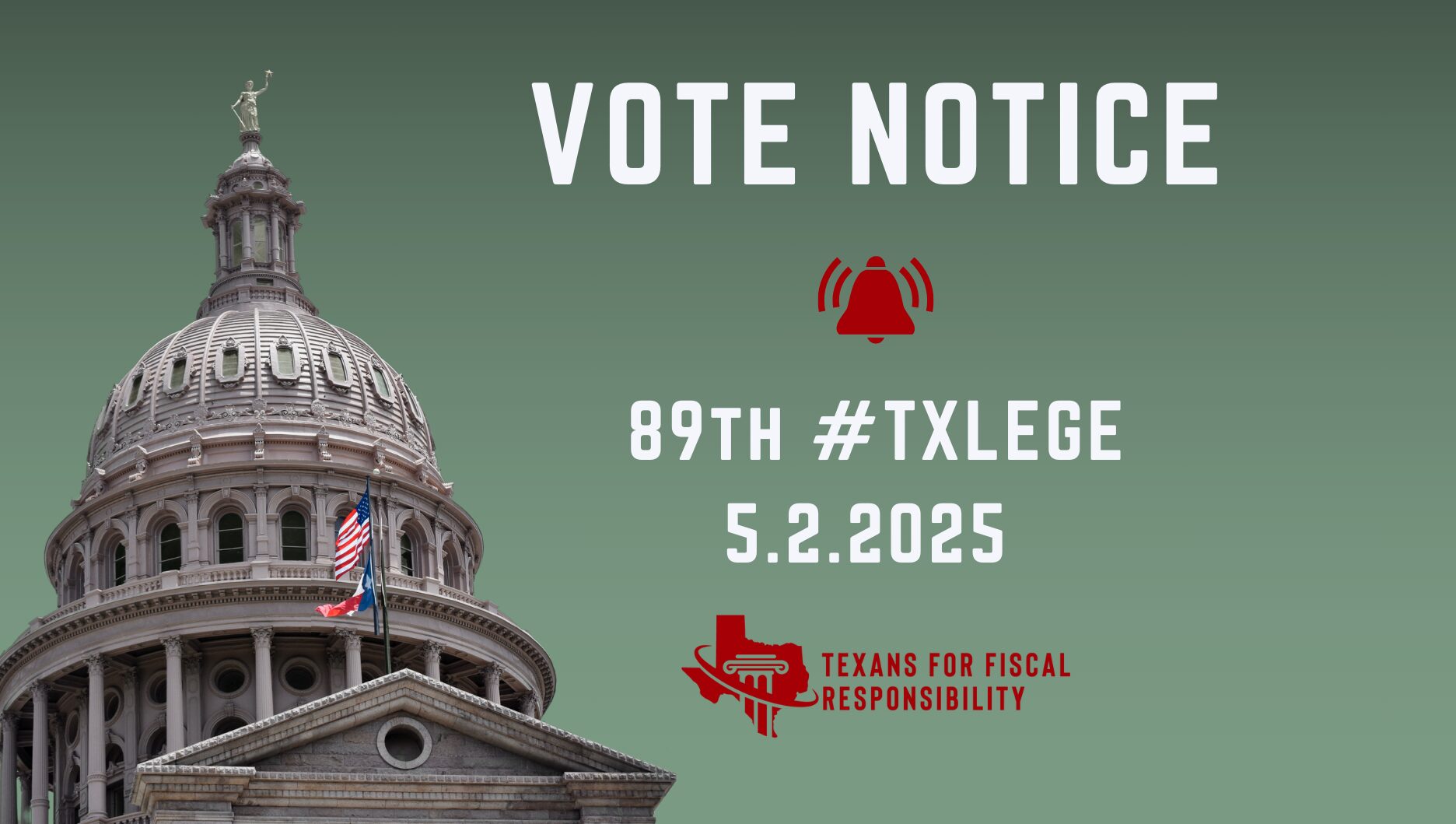
Texans for Fiscal Responsibility has issued the following vote notice for May 2nd, 2025
Texas House of Representatives
Subject: House Joint Resolution 138 (HJR 138) – Ban on Carbon Tax
- Author: State Rep. Daniel Alders (R-Tyler)
- Caption: Proposing a constitutional amendment prohibiting the imposition of a carbon tax.
- TFR Position: SUPPORT
- Background:
- HJR 138 proposes a state constitutional amendment that would ban Texas from ever imposing a carbon tax. This includes any taxes on carbon content in fuel or emissions from energy use, manufacturing, or everyday consumption. It aims to protect Texas’s vital oil and gas sector from anti-industry climate policies seen in other countries. By enshrining this protection in the constitution, it provides long-term certainty for energy producers and consumers. It defends jobs, keeps energy costs down, and prevents future lawmakers from using carbon taxes to grow government revenues. Supporting this amendment ensures Texas stays economically competitive and safeguards taxpayers from burdensome environmental levies.
Subject: House Bill 42 (HB 42) – Higher ed spending increase.
- Author: State Rep. Terry Wilson (R-Georgetown)
- Caption: Relating to the amount and allocation of the annual constitutional appropriation to certain agencies and institutions of higher education and to the permissible uses of that money.
- TFR Position: OPPOSE
- Background:
- HB 42 would double the annual allocation to the Higher Education Fund, committing an additional $393.75 million in general revenue every year with no clear fiscal offset. This massive spending increase—totaling nearly $2 billion over five years—expands the size and scope of government without addressing performance metrics or efficiency benchmarks in higher education. Rather than providing targeted relief to taxpayers or reducing tuition burdens, the bill pours more money into a system already struggling with accountability and bloated administrative costs. The bill makes no serious effort to reduce waste or reform how capital funds are used by institutions. At a time when the state should be prioritizing property tax relief or limiting government growth, this bill moves in the opposite direction.
Subject: House Bill 104 (HB 104) – Raids rainy day funds
- Author: State Rep. Greg Bonnen (R-Friendswood)
- Caption: Relating to the creation of the Texas future fund and the Texas future fund investment review board and to the permissible uses of money in the Texas future fund.
- TFR Position: OPPOSE
- Background:
- HB 104 diverts $5 billion from the state’s Rainy Day Fund to create a high-risk investment vehicle aimed at developing frontier technologies. While marketed as economic development, this initiative empowers a politically appointed board to steer taxpayer money into speculative sectors with no guarantees of return. The fund reduces the financial cushion meant for true emergencies and could expose state resources to market volatility. Administrative and investment expenses are also pulled from the fund itself, compounding taxpayer risk. This bill is a departure from sound, conservative budgeting—prioritizing government-directed venture capital over tax relief and core responsibilities. Instead of expanding government-led investment schemes, lawmakers should return surplus funds to taxpayers.
Subject: House Bill 129 (HB 129) – Ban contracts with foreign adversaries
- Author: State Rep. John McQueeney (R-Fort Worth)
- Caption: Relating to a prohibition on certain governmental contracts with foreign adversary companies and federally banned companies; authorizing a civil penalty.
- TFR Position: SUPPORT
- Background:
- HB 129 protects Texas taxpayers from inadvertently funding entities tied to hostile foreign regimes by banning government contracts with adversary-controlled or federally blacklisted companies. It ensures that public dollars aren’t used to support or strengthen governments like China, Russia, or Iran, which pose clear national security and economic risks. This reduces the chance of taxpayer money going to foreign actors engaged in intellectual property theft, espionage, or technological sabotage. The bill empowers state agencies to immediately terminate contracts and block violators from future deals, limiting long-term fiscal risk. This is a prudent bill that focuses public procurement on safeguarding citizens and core state interests.
Subject: House Bill 426 (HB 426) – Medicaid Expansion
- Author: State Rep. Diego Bernal (D-San Antonio)
- Caption: Relating to Medicaid and child health plan program coverage and reimbursement for childhood cranial remolding orthosis.
- TFR Position: OPPOSE
- Background:
- HB 426 mandates new Medicaid and CHIP coverage for custom helmets used to treat certain head shape conditions in infants, regardless of whether insurers or doctors deem them medically necessary or cosmetic. While well-intentioned, this bill imposes a costly expansion of government healthcare obligations, with more than $5 million in new annual spending by 2030. The legislation creates a precedent for adding condition-specific benefits that may not be essential or cost-effective, opening the floodgates for other narrowly tailored mandates. The bill increases state spending without structural reforms or demonstrated long-term savings. Medicaid is already one of the fastest-growing items in the Texas budget. Fiscally conservative policy should prioritize flexibility and restraint over rigid mandates that tie the state’s hands. With no meaningful cap on utilization or cost, HB 426 risks growing the Medicaid bureaucracy and creating inefficiencies.
Subject: House Bill 668 (HB 668) – One-year LTC renewal grace period
- Author: State Rep. Cecil Bell (R-Magnolia)
- Caption: Relating to the renewal of a license to carry a handgun.
- TFR Position: SUPPORT
- Background:
- HB 668 provides a practical fix for law-abiding Texans who unintentionally let their handgun licenses expire. Rather than forcing these individuals to jump through costly and redundant bureaucratic hoops, the bill creates a one-year grace period for license renewal. This saves time, avoids duplicative government processing, and respects the rights of gun owners. The renewal still requires confirmation of key information. This measure prevents wasteful reprocessing and reduces administrative burdens. It aligns with limited-government principles by eliminating unnecessary red tape. Overall, it streamlines licensing while maintaining respecting Second Amendment rights.
Subject: House Bill 1699 (HB 1699) – Limits electronic patient information access
- Author: State Rep. Caroline Fairly (R-Amarillo)
- Caption: Relating to the disclosure of certain medical information by electronic means.
- TFR Position: OPPOSE / AMEND
- Background:
- HB delays the electronic release of certain sensitive medical test results to give doctors time to review and communicate them personally. While well-intentioned, the bill adds bureaucratic complexity and could interfere with timely patient access to care, and interferes with individuals personal decision making ability. The bill should be amended to allow patients to opt into or out of this delay. Streamlining patient-doctor communication through voluntary tools or flags in patient portals could achieve the same goal without a blanket policy. For these reasons, TFR opposes HB 1699 unless amended.
Subject: House Bill 3717 (HB 3717) – Ibogaine Drug Research
- Author: State Rep. Cody Harris (R-Palestine)
- Caption: Relating to the establishment of a grant program to fund the United States Food and Drug Administration’s drug development trials with ibogaine for the purpose of securing the administration’s approval as a medication for treatment of opioid use disorder, co-occurring substance use disorder, and any other neurological or mental health conditions for which ibogaine demonstrates efficacy.
- TFR Position: SUPPORT / AMEND
- Background:
- HB 3717 is a bill to facilitate FDA-approved clinical trials for ibogaine, a non-traditional therapy showing promise in treating opioid addiction, PTSD, and related mental health conditions—issues especially prevalent among Texas veterans. While well intentioned, concerns have been raised regarding the differences between HB 3717, and its Senate companion, SB 2308. While SB 2308 includes safety and regulatory requirements for ibogaine if and when it is legalized, HB 3717 does not include those provisions. Additionally, HB 3717 includes a provision to allow for legislatively appropriated funds, while the Senate version limits the program to private donations, gifts or grants. Though the bill involves state coordination, the bill seeks to solve real problems through private sector leadership and careful oversight. However, HB 3717 should be amended to align with the senate version, to provide the safety and taxpayer protections that SB 2308 affords.
Subject: House Bill 3883 (HB 3883) – Corporate Welfare for Entertainment
- Author: State Rep. Lulu Flores (D-Austin)
- Caption: Relating to the eligibility of a Federation Internationale de l’Automobile (FIA) World Endurance Championship international automobile race for funding under the major events reimbursement program.
- TFR Position: OPPOSE
- Background:
- HB 3883 would expand taxpayer-funded subsidies to include another international sporting event—specifically, the FIA World Endurance Championship auto race. This bill enables state funds to be used to reimburse private event promoters through the Major Events Reimbursement Program. While supporters claim it brings economic benefits, these claims often overstate actual returns and underestimate hidden costs. Handing out subsidies to profitable global entertainment ventures like auto racing is corporate welfare—not prudent fiscal management. Texas taxpayers should not be footing the bill to lure events that can already operate profitably in a free market. Every dollar used for these subsidies is a dollar not used for actual public needs or tax relief. Expanding this program opens the door to further misuse of taxpayer dollars under the guise of “economic development.”
Subject: House Bill 2788 (HB 2788) – Protects fraud detection tools
- Author: State Rep. Angie Button (R-Garland)
- Caption: Relating to the disclosure of certain fraud detection information obtained in the administration of the unemployment compensation system.
- TFR Position: SUPPORT
- Background:
- HB 2788 protects the fraud prevention methods used by the Texas Workforce Commission from being exposed through open records requests. By shielding internal protocols, assessments, and investigative tools from public release, the bill ensures that fraudsters cannot game the system. This enhances the integrity of Texas’ unemployment compensation program and safeguards taxpayer dollars from abuse. For fiscally conservative advocates, this measure supports government efficiency by helping reduce fraudulent claims and administrative waste. The bill is tightly scoped to cover only information related to fraud prevention, not general operations, and it does not expand government authority or create new bureaucracy. This is a proactive, defensive move that can help avoid expensive fraud investigations down the road.
Subject: House Bill 3305 (HB 3305) – County tax on private hospitals
- Author: State Rep. Keresa Richardson (R-McKinney)
- Caption: Relating to the creation and operations of a health care provider participation program in certain counties.
- TFR Position: OPPOSE
- Background:
- HB 3305 gives Collin County the authority to levy mandatory payments on nonpublic hospitals in order to receive additional federal Medicaid dollars. While marketed as a way to support indigent care, this bill essentially creates a new hospital tax without voter approval. It sets up a mechanism where county officials can impose annual fees—up to 6% of hospital revenue—to draw down federal funds. Though the bill contains limits on administrative costs and restricts the use of funds for Medicaid expansion, it still represents an expansion of government financing schemes that rely on coercive revenue collection. This creates a precedent for counties to tax private entities, without voter approval, to fund public services indirectly, opening the door for cronyism and lack of transparency. The hospitals cannot pass the costs to patients, but the financial burden will inevitably impact service quality or lead to cost-shifting elsewhere. This program embeds the county further into the federal Medicaid system, which is already bloated and financially unsustainable. Rather than taxing local providers, the county should pursue more market-oriented, transparent, and voter-approved solutions to health care access.
Subject: House Bill 3490 (HB 3490) – Weakens government meeting transparency
- Author: State Rep. Mano DeAyala (R-Houston)
- Caption: Relating to the authority of the governing board of certain state agencies to conduct a closed meeting with the agency’s internal auditor to deliberate or receive information about certain internal audit matters.
- TFR Position: OPPOSE
- Background:
- HB 3490 creates a new exemption to Texas’ open meetings law by allowing state agency boards to meet privately with their internal auditors when discussing sensitive audit issues. While well intentioned, the bill erodes transparency in government operations by shielding key oversight discussions from public view. Taxpayers have a right to monitor how agencies manage public resources, especially when audits uncover waste or inefficiencies. Limiting public access to these deliberations invites mistrust and weakens accountability. Instead of reforming the process for sensitive information, the bill bypasses the public altogether. The measure favors bureaucratic convenience over open government.
Subject: House Bill 1295 (HB 1295) – Health literacy planning mandate
- Author: State Rep. Mihaela Plesa (D-Dallas)
- Caption: Relating to a health literacy plan developed by the statewide health coordinating council and the inclusion of health literacy in the state health plan.
- TFR Position: OPPOSE
- Background:
- HB 1295 instructs a state health council to craft and update a long-term plan focused on improving Texans’ health literacy—essentially how well people understand and use medical information. It expands government responsibilities by adding yet another planning mandate, which could lead to increased bureaucracy and future spending obligations without clear accountability or measurable cost-savings. It also risks mission creep by turning the state health plan into a platform for soft regulatory initiatives. There are no guarantees that the recommendations will actually reduce costs, despite claims to that effect. Taxpayers should be concerned about the slow and costly expansion of state health planning authority.
Subject: House Bill 4214 (HB 4214) – Centralized public information request directory
- Author: State Rep. Pat Curry (R-Waco)
- Caption: Relating to public access to the mailing address and electronic mail address designated by a governmental body to receive a request for public information under the public information law.
- TFR Position: SUPPORT
- Background:
- HB 4214 improves government transparency by requiring all public agencies in Texas to report their contact info for public records requests to the state attorney general each year. The information must then be published in a single online database, making it easier for taxpayers to access government records. This common-sense reform promotes accountability without creating new bureaucracy or expanding government power. It ensures compliance with existing public information laws while minimizing confusion and inefficiency. The bill has no cost implications, avoids unfunded mandates, and does not impose penalties or overregulation. This reform supports individual rights to information without growing the size of government.
Subject: House Bill 2783 (HB 2783) – Automatic paycheck deductions
- Author: State Rep. Linda Garcia (D-Mesquite)
- Caption: Relating to automatic participation by certain county employees in deferred compensation plans provided by certain counties.
- TFR Position: OPPOSE
- Background:
- HB 2783 permits Texas counties to automatically enroll newly hired employees in retirement savings plans, deducting 3% of their salary unless they opt out. While intended to boost retirement participation, the bill undermines personal responsibility and informed financial consent by enrolling employees without affirmative approval. Though opt-outs are allowed, the default enrollment design risks confusing employees or trapping them in unwanted plans. This bill shifts the norm from voluntary savings to government-guided paternalism, which is contrary to limited government principles. Additionally, it opens the door for politicized or suboptimal default investment options managed by public administrators rather than chosen by individuals. Mandating any automatic financial deductions—even with an opt-out—blurs the line between employer guidance and government overreach. Rather than expanding bureaucracy in retirement planning, counties should focus on educating employees and preserving individual choice.
Subject: House Bill 5085 (HB 5085) – Taxpayer-funded seed bank research study
- Author: State Rep. Barbara Gervin-Hawkins (D-San Antonio)
- Caption: Relating to a study on the impact of certain seed banks and seed preservation on access to food and the environment.
- TFR Position: OPPOSE
- Background:
- HB 5085 orders a taxpayer-funded study to evaluate the environmental and food access benefits of seed banks, but only in Texas’ largest counties. The Department of Agriculture is required to coordinate with outside entities and produce a report by late 2026. The bill does not include direct spending but would cost $150,000 in public funds, according to the Legislative Budget Board. However, the department has admitted it lacks the expertise to perform the study and would outsource it to academic institutions. This raises concerns about inefficiency, mission creep, and unnecessary spending on speculative projects. From a limited-government perspective, the bill expands bureaucracy and could lead to future taxpayer spending without guaranteeing tangible outcomes.
Subject: House Bill 3426 (HB 3426) – State-run digital ID system
- Author: State Rep. Giovanni Capriglione (R-Southlake)
- Caption: Relating to the issuance of digital driver’s licenses, commercial driver’s licenses, and personal identification certificates; authorizing a fee.
- TFR Position: OPPOSE
- Background:
- HB 3426 mandates the creation of a new government-managed system to issue digital forms of driver’s licenses and identification. While marketed as a modern convenience, the bill grants the Department of Public Safety broad rulemaking powers and the ability to impose new fees, effectively growing government bureaucracy. It creates a parallel infrastructure to physical IDs, requiring taxpayer resources for app development, cybersecurity protocols, and ongoing administration. This expansion invites potential overreach, particularly concerning data privacy and device access concerns, and could open Texans up to privacy concerns. Though the digital IDs are optional, they open the door to future mandates or government tracking under the guise of “modernization.” Taxpayers should not foot the bill for a solution in search of a problem.
Texas Senate
NONE
Reminder: Vote Notices are provided to both Texas state lawmakers and the general public, sharing Texans for Fiscal Responsibility’s position on issues to be rated as a part of the Fiscal Responsibility Index. Notices are provided prior to votes being taken in each legislative chamber.
Disclaimer: We reserve the right to consider amendments to legislation that may be introduced without notice as a part of issues to be rated on the Fiscal Responsibility Index. We will make every effort to provide notice on amendments that are pre-filed.




